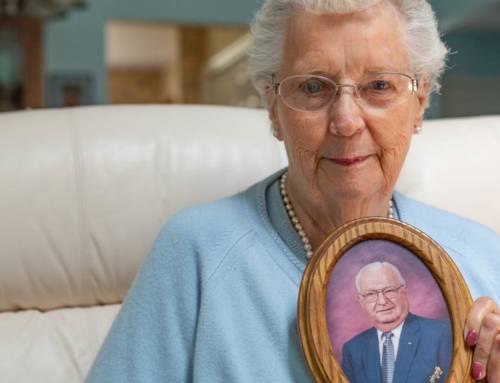
About the Author: Sunday Sermons from Sell Chapel are written by Rev. Preston Van Deursen, Director of Pastoral Care at the Masonic Village at Elizabethtown.
Someone wrote these words: “Hurting people hurt people.” I really believe that they are true! A father and a son were walking together in the woods and they came upon an animal that had been caught in a hunter’s trap. The animal was in obvious distress. The son rushed forward to free the animal, but his father stopped him. “Son,” he said, “Be careful. A hurt animal will bite those close around – even someone who is trying to help him.” What is true of animals is true of people. Hurting people hurt people. We’ve all seen parents under too much stress strike out at their children.
An unknown author captured the frustration and the quilt of many parents when he or she wrote:
A weary mother returned from the store,
Lugging groceries through the kitchen door.
Awaiting her arrival was her 8 year-old son,
Anxious to relate what his younger brother had done.
“While I was out playing and Dad was on call,
T.J. took his crayons and wrote on the wall!
It’s on the new paper you just hung in the den.
I told him you’d be mad at having to do it again.”
She let out a moan and furrowed her brow,
“Where is your little brother right now?”
She emptied her arms and with a purposeful stride,
She marched to his closet where he had gone to hide.
She called his full name as she entered his room
He trembled with fear—he knew that meant doom!
For the next ten minutes, she ranted and raved!
About the expensive wallpaper and how she had saved.
Lamenting all the work it would take to repair,
She condemned his actions and total lack of care.
The more she scolded, the madder she got,
Then stomped from his room, totally distraught!
She headed for the den to confirm her fears.
When she saw the wall, her eyes flooded with tears.
The message she read pierced her soul with a dart.
It said, “I love Mommy,” surrounded by a heart.
Well, the wallpaper remained, just as she found it,
With an empty picture frame hung to surround it.
A reminder to her, and indeed to all,
Take time to read the handwriting on the wall.
Hurting people hurt people. Parents take out a hard day on their children. Religious people with fears about their self-worth take it out on others.
Motivational speaker Zig Ziglar has a favorite story that he tells across the country. You may have heard it before. It comes from a retired seminary professor, Dr. Fred Craddock—a man who influenced thousand of pastors and lay people of every religious persuasion. Craddock and his wife were on vacation in Eastern Tennessee on the Smoky Mountains. They had gone to a place called the Black Bear Inn, a restraint. One side of the building was all glass. You could look out over the mountains and have your dinner. “It was just beautiful,” says Craddock.
While they were waiting for their dinner, an elderly man, perhaps in his eighties, with a shock of white hair came over to their table and said, “Good evening.” Craddock took him to be the proprietor. “Good evening,” Craddock replied. “You on vacation?” the man asked. “Yes,” Craddock replied. “Where are you from?” the elder man asked. Now that was none of his business, Craddock thought to himself, but to be polite he replied, “Oklahoma.” “Oklahoma!” The man repeated. “I’ve never been to Oklahoma.” Craddock was getting somewhat impatient with his intruder. “What do you do?” the man asked. “Well, I teach seminary,” Craddock responded. “Oh, you teach preachers!” said the man as he pulled up a chair. “I’ve got a story about a preacher.”
Inwardly Craddock groaned. Everybody’s got a story about a preacher. The elderly man said, I was born back here in these mountains. My mother was not married. And the reproach that fell upon her, fell upon me. The children at school had a name for me and it hurt. It hurt very much. During recess I would go and hide in the weeds until the bell rang. At lunchtime I took my lunch and went behind a tree to avoid them. When I went to town with my mother…men and women would stare at her and then at me…I knew they were trying to guess whose I was. A painful time.
I guess I was in the 7th or 8th grade and I started to go and hear a preacher. He frightened me in a way and he attracted me in a way. He wore a clawhammer tailcoat, striped trousers and had a face that looked like it had been quarried out of the mountain. He thundered……I was afraid people would say, “What’s a boy like you doing in church?” So I just went in time for the sermon and then I’d rush out. He said, “One Sunday, however, some women had qued up the aisle and I couldn’t get out and I began to get cold and sweaty. I wondered, Oh, oh, somebody’s going to speak to me, “What’s a boy like you doing in our church?” And then I felt a hand on my shoulder. I looked out of the corner of my eye and saw that beard and saw that face. “Oh, boy!” said the man. “That minister stared at me and looked at me and stared at me and I thought, ‘Oh, no. Oh, no. he’s gonna guess.’ He said, ‘Well boy, you’re the child of ah….You’re the child of ah….Ah, wait.’ And the preacher said, ‘You’re a child of God. I see a strikin’ resemblance!’ he swatted me on the bottom and said, ‘Go claim your inheritance, boy!’”
Fred Craddock said he looked at the elderly man seated at their table and asked, “What’s your name?” The elderly man said, “Ben Hooper” and got up and walked away. “Ben Hooper, Ben Hooper, Ben Hooper!” Craddock thought to himself. And suddenly it came to him that his father had told him about the time when, the people of Tennessee had elected a man named Ben Hooper, who had been born to an unwed mother, as governor of their state and he had been one of the best governors the state had ever had.
What a grand ending to the story. But we all know that every story doesn’t turn out that way. Those who claim to be religious people have been known for their cruelty to those who are not like them. We know it’s true, hurting people hurt people. Then we come to the words of Jesus: “love your enemies, do good to them that hate you, bless those who curse you, pray for those who despitefully use you. If someone strikes you on the cheek offer also the other…Be merciful even as your Father is merciful…And judge not: and you shall not be judged…”
Why do we find it so hard to live like that? Why do we feel the need to strike out at others—whether they are our children or our spouse or our neighbor or another race, or someone whose lifestyle is deplorable by our standards? Why can’t we live and let live? Why do we have to utter hurtful words to or about any other human being? And why do other people, sometimes those closest to us, turn on us and say such hurtful things? The answer lies in this simple phrase: Hurting people hurt people.
We need to recognize, first of all, that people who hurt us and others, may themselves have hurts that are causing them to act out in ways that they never would otherwise. When we encounter someone who is lashing out at other people, we need to ask: What could be going on in their lives that causing them to behave this way?
A professor tells about a scathing letter he received at a college where he once served. The first few lines were demoralizing. After reading a few paragraphs he skipped to the end of the letter to see who the writer was. He did not recognize the signer so he phoned the registrar and asked him to bring the folder of the student whose name was on the letter. The registrar walked in a few minutes later with the folder and had the flap of it pulled to back to reveal the picture of the young lady who had written the letter. He recognized her at once, and his feelings of defensiveness against her harsh letter melt into understanding.
She was a beautiful young woman who had suffered a diving accident the previous year at summer camp and was paralyzed from her neck down. Although the state paid the bill and the college people, including students, did all they could to help her, she was unable to accept herself after the accident. She lashed out at the people who pushed her wheelchair. She was angry at everyone and torn up over every and anything that related to her. Her letter to the professor addressed his insensitivity to her needs on campus. His momentary spirit of anger eased into a mellowness as he said to himself, “I really don’t know what my attitudes might be if I were forced to cope with the same kinds of physical problems that she has to cope with.”
The angry driver who screams at us in traffic, the impatient cop who pulls us over and refuses to listen to our explanation, the spouse who is constantly belittling us—all may have things going on in their lives that are causing them great distress. Whenever anyone lashes out at us with hurting words or attitudes, rather than striking back, we need to ask ourselves what could be causing them to act out their anger this way. Sometimes we can defuse the situation by a quiet comment like, “It must be very stressful having to deal with what you deal with all day.” Hurting people hurt people.
Secondly, we need to recognize that when we hurt it may affect how we respond to others. We can hurt others when we are hurting.
There is a term today used by many psychiatrists, it is “LFT” Any of us have LFT? This abbreviated term addresses a prevalent problem in our society. LFT stands for “Low Frustration Tolerance.” Many Americans are walking time-bombs just waiting to explode. We have allowed circumstances, situations, schedules and people to crowd out our ability to tolerate frustrations. For this reason so many of us live on the edge and erupt with anger when frustrations arise. Low Frustration Tolerance. It doesn’t tale much to set us off. Especially when we are tired. Especially when we are feeling down on ourselves. Especially when, like the animal in the trap, we feel vulnerable. We need to examine ourselves and ask ourselves why we act as we do. We are causing untold damage to those around us—especially those we love, those we depend on.
We need to see my friends, that the only way we can heed Christ’s command to love like he loved is to surrender to his spirit. Jesus never lashed out at anyone—except the people who elevated the law of religion over the love of people, or who used religion for their own ends. Jesus never called anyone a sinner. Jesus never demeaned anyone over their lifestyle. Even on the cross he forgave those who put him there. He showed that it was possible to love your enemy. How can we ever live like that?
Well, first we need to surrender our hurts to him. Most of us have scars that no one else can see. And under stress, under pressure, when we are fatigued, those scars reveal themselves in inappropriate behavior. We need to surrender those hurts to Jesus. We need to pray, “Lord, cleanse me of all those unhealthy emotions that keep me from being what my family needs, what my company needs, what my community needs, and what you need from me.”
Hurting people hurt people. Jesus tells us how to deal with hurting people this day. We forgive them as Christ has forgiven us, we judge not so that we won’t be judged.
It is not easy, but when we do, we begin to understand that peace which passeth all understanding. May it be upon each of this day. And may our hearts be given to the one who died for all of us, and teaches us to love and to say, “Father forgive them for they know not what they do.”




